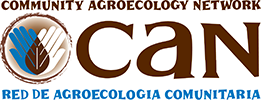CAN Associate Director Heather Putnam recently visited the Zona Maya in Quintana Roo, Mexico to meet with women’s groups working with CAN and the Intercultural Maya University of Quintana Roo (UIMQRoo) to improve household food security and sovereignty in a two year project funded by the W.K. Kellogg Foundation. Here is her report from the field.
I traveled with Robin Pacheco, a project field technician, and three UIMQRoo students working in the field, to four of the six rural communities we are working with in the Zona Maya. The goal of the collaborative project between CAN and UIMQRoo is to improve household food security and nutrition by promoting increased production diversity (more vegetables and protein sources) and income diversification. The project team on the ground is made up of professors, field technicians, and students works directly with small groups of indigenous Maya women in the communities to strengthen traditional and agroecological food production practices, establish direct market channels between the women’s groups and local and regional venues like restaurants and markets, and also to ensure the long-term sustainability of the women’s groups themselves to operate these enterprises.
Our first stop was the community of Kancabchen, a community that was recently integrated into the project in October 2014. The eight women there established their vegetable gardens in October, and have now expanded their home production from yams, beans, and tomatoes to include habanero chile, green chiles, Maya squash, cilantro, radishes, and cucumbers. They told me that they were happy to have these products available right behind their houses for their families’ tables. Lidia Moo Poot, the president of the women’s organization, told me “Now we can have confidence in what we eat and what it contains. Our children will grow up healthier.”
I also visited the communities of Candelaria, Bulukax, and Tabasco and spoke with the women’s groups there. The women in Candelaria are expanding their chicken and egg production through the project and are anticipating have enough hens producing enough eggs to bring to market in about six months. In the meantime they will be working with the team at UIMQRoo to establish relationships with buyers who will value the organic production and healthiness of their eggs. In Bulukax and Tabasco my conversations with the women’s groups were dominated by their worries about water — they are affected not only by the drought, but by salty groundwater or chlorinated municipal water, both unfit for irrigation. These conversations only reinforced by understanding of the urgency of focusing on ways to improve water access; any changes we hope to make in increasing the availability of healthy and nutritious foods year round will depend on water.






